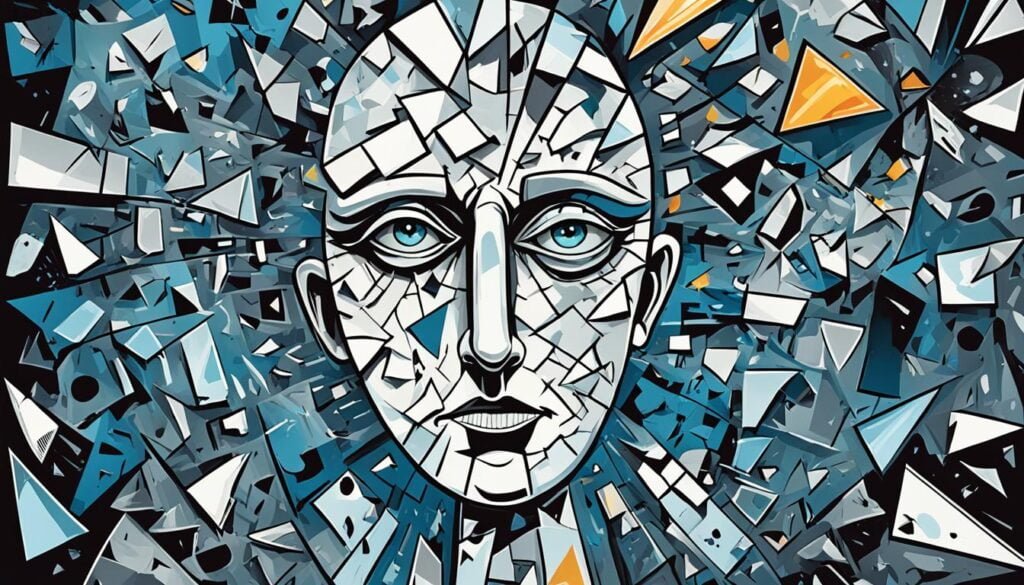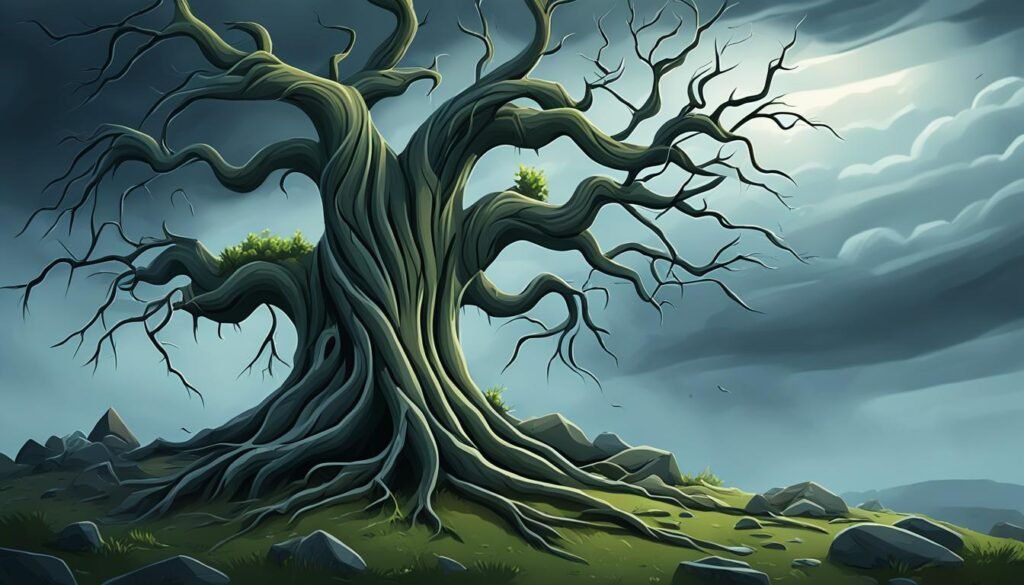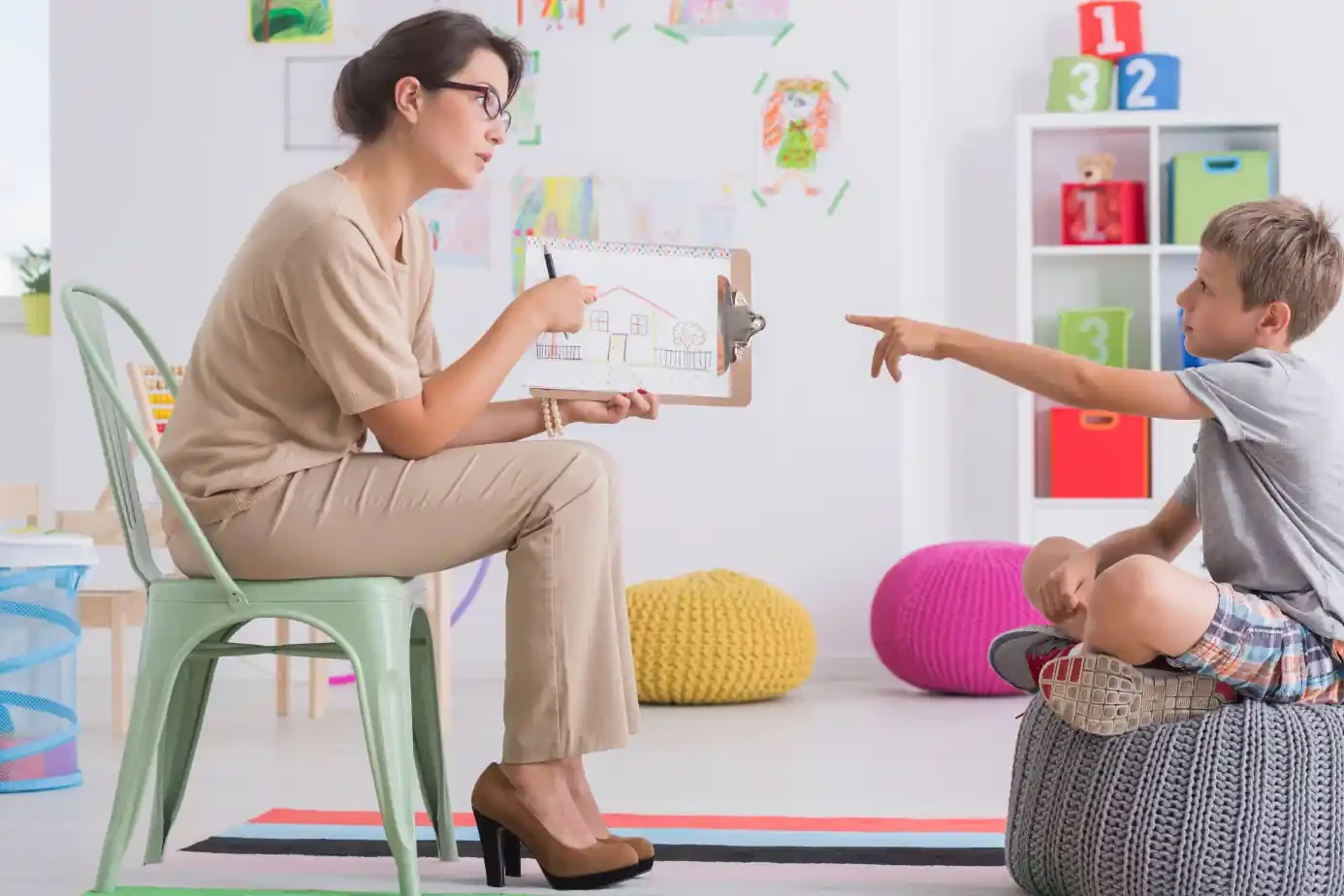Childhood trauma is a big issue that often gets overlooked. It can deeply affect a person’s well-being and growth. Things like abuse, neglect, or living in a troubled home can harm a child’s brain, feelings, and identity. This can make them feel unsafe and insecure.
About two-thirds of adults have had a tough time as kids. This includes things like abuse or living in a bad home. If someone had more than one bad experience, they’re more likely to face problems later on. These problems can include mental health issues, drug use, health problems, and even dying too soon.
Looking into childhood trauma, it’s key to know the different kinds of bad experiences kids can go through. We’ll see how common these are and how they affect things like relationships and health. This article aims to shed light on the serious effects of childhood trauma. It aims to help you support those affected and work towards healing and bouncing back.
Table of Contents
ToggleWhat is Childhood Trauma?
Childhood trauma is a broad term for bad experiences during a child’s early years. These can be physical, emotional, or sexual abuse, or even neglect. It also includes issues with attachment, living in a dysfunctional home, or seeing violence. What makes childhood trauma so serious is how it deeply affects a child’s brain, feelings, and identity.
Types and Prevalence of Traumatic Childhood Experiences
Studies by the Centers for Disease Control and Prevention (CDC) show that many adults have had a tough childhood. About two-thirds of adults have faced at least one bad experience as kids. If someone had more than one bad experience, they’re more likely to face serious problems later on. These can include mental health issues, substance abuse, health problems, and even dying too soon.
The kinds of childhood trauma include:
- Physical abuse
- Emotional abuse
- Sexual abuse
- Neglect
- Household dysfunction (e.g., domestic violence, substance abuse, mental illness)
- Attachment issues
- Exposure to violence
It’s important to understand how common and serious these childhood traumas are. This helps us see the long-term effects they have. It also helps us find ways to prevent and help with these issues.
Lasting Effects on Attachment and Relationships
Childhood trauma deeply affects how we form lasting relationships. If a child faces instability, unpredictability, or abuse, they might struggle to trust others later. This can lead to attachment styles that make forming connections hard.
Those who faced trauma as kids may find it tough to express feelings, set boundaries, or see others as allies. This can cause problems in forming and keeping up healthy relationships. It affects romantic ties, friendships, and even how they see authority figures.
As adults, this trauma can still affect how we parent our kids, continuing cycles of dysfunction. It’s key to deal with the childhood trauma and attachment issues to break these patterns. This helps in building strong, meaningful connections.
Physiological Consequences of Childhood Trauma
Childhood trauma can deeply affect a person’s health. Stress during important growth stages can harm the brain and nervous system. This can lead to ongoing health problems.
Impacts on Brain Development and Physical Health
Kids who face trauma, like neglect or abuse, might have ongoing health issues. These can include headaches or stomachaches. As adults, they may face more serious health problems, like heart disease or obesity.
They might also turn to unhealthy habits, such as smoking or poor eating. This can make their health issues worse.
Childhood trauma can also affect how the body works. Kids who have been through a lot might not feel pain when they hurt themselves or they might feel pain for no clear reason.
Not having enough mental and emotional support as a child can also hurt brain development. This can affect how well someone thinks, controls their feelings, and stays healthy.
Emotional and Behavioral Manifestations
Childhood trauma can deeply affect people. Kids who have gone through complex trauma find it hard to handle their feelings. They might not know how to show or control their emotions.
This can lead to big feelings of sadness, worry, or anger. They might act out or seem really upset over small things. Or, they could seem not to care about threats around them, making them more likely to face harm again.
Children who have faced trauma also might have trouble with their actions. They can easily get upset and have a hard time controlling their feelings and actions. This means they might react strongly to small stressors.
It’s important to understand how trauma affects kids’ feelings and actions. This helps us know how to help them. By tackling these issues, people can start to heal and find better ways to deal with stress.
Cognitive and Learning Difficulties
Children who face trauma early in life often struggle with their thinking and learning. They might find it hard to think critically, solve problems, and plan for the future. This is because they use most of their energy just to survive, leaving little for calm thinking.
Childhood trauma can show up in many ways. Kids may have trouble learning new things, remembering facts, and staying focused. They might get easily distracted or always be on high alert, making it tough to learn. Also, they might not be good at planning or thinking of different ways to solve problems.
Challenges in Problem-Solving and Future Orientation
Kids who have been through a lot may not be able to solve problems calmly or think clearly. Their past trauma can make it hard for them to see different solutions or pick the best one. This can affect how they plan for the future and make decisions.
- Difficulty in acquiring new skills and information
- Struggles with sustaining attention and focus
- Challenges in problem-solving and decision-making
- Impaired future orientation and planning abilities
These challenges can really affect a child’s learning and growth. That’s why they need special help and support at school. By understanding how trauma affects thinking and learning, teachers and caregivers can help these kids more. They can work to overcome the hurdles they face.
Impacts on Self-Perception and Identity
Childhood trauma deeply affects a child’s self-image and identity. Kids learn their worth from how their caregivers treat them. Abuse or neglect makes them think they’re “bad” or “not good enough.” This leads to feeling ashamed, guilty, and having low self-esteem.
This negative view of oneself can last into adulthood. It hurts a person’s ability to bounce back and know who they are. A child who faced trauma may find it hard to see their true value. They might struggle to make strong relationships and grow personally.
Dealing with the effects of childhood trauma on self-image and identity is crucial. It needs care from a top neurologist like Dr. Chandril Chugh. With help, people can start to see their self-worth and build a positive identity.

Getting over childhood trauma’s effects takes time and support. But, with the right approach, people can find a healthy, strong sense of self. It’s important to be kind, patient, and understand how trauma affects a child’s growth.
The impact of childhood trauma on Mental Health
Childhood trauma can deeply affect your mental health. Traumatic events in your early years can lead to serious mental health issues. These include post-traumatic stress disorder (PTSD), depression, anxiety, and substance abuse.
Children who go through trauma may relive the event in their minds. They might avoid things that remind them of the trauma or stay alert for danger. Even if they don’t get PTSD, they can still face emotional and behavioral problems.
These problems can include anger, trouble focusing, changes in eating, worrying too much about death or safety, being easily irritated, and refusing to go to school.
Not dealing with childhood trauma can harm your mental health a lot. It’s important to get help and use therapies that understand trauma. This can help you heal and become more resilient.
- Childhood trauma can lead to PTSD, depression, anxiety, and substance abuse.
- You might relive the trauma, avoid certain things, or always be on guard.
- Even without PTSD, trauma can cause emotional and behavioral issues.
- Getting professional help and using trauma-informed therapies is key to healing.
Resilience and Coping Strategies
Childhood trauma can deeply affect people, but there is hope for healing. By building resilience and learning coping skills, those who have faced trauma can take back control of their lives. Studies show that getting help early and having a strong support network is key. This helps kids bounce back from trauma and grow strong.
Importance of Early Intervention and Support Systems
Therapies like cognitive behavioral therapy and trauma-focused therapy help a lot. They address the emotional and mental effects of trauma. Early support helps kids develop better ways to cope, grow resilient, and protect their mental health.
Having a strong support system from family, friends, or professionals is crucial. With the right help, people can handle their feelings, build strong relationships, and regain control over their lives.
Intergenerational Trauma and Cycles of Adversity
Childhood trauma can affect more than just the person who experienced it. It can keep causing problems and hardship across generations. This is called intergenerational trauma. It happens when bad experiences are shared from one generation to the next, affecting the growth and health of future family members.
Childhood trauma can hurt a child’s growth, making them more likely to have health and mental problems later. These issues can then be passed on to their kids, starting a cycle of trauma transmission and cycles of adversity. Kids who live with trauma, abuse, or neglect are more likely to face their own traumatic events. This keeps the cycle of trauma going.
To stop these cycles, we need to understand how trauma is passed down. We must tackle the main causes of trauma, help families, and build resilience across generations. Knowing about intergenerational trauma helps us create better environments for kids. This can help stop the cycle of trauma and improve well-being over time.

It’s key to recognize and deal with intergenerational trauma for real change. By ending the cycles of hardship, we help people heal and succeed. This way, we can make a better future for many generations.
Healing and Recovery from Childhood Trauma
Childhood trauma can have a big impact, but there are ways to heal and recover. Creating safe and caring environments is key. This helps fight the trauma’s effects and builds safety inside you.
Talking to a mental health expert who knows about trauma can really help. Therapies like cognitive processing therapy (CPT), trauma-focused cognitive behavioral therapy (TF-CBT), and eye movement desensitization and reprocessing (EMDR) can work well. They help with the emotional, behavioral, and thinking effects of trauma.
Trauma-Informed Therapies and Approaches
With the right help and tools, people who have been through trauma can take back control of their lives. Trauma-informed therapies create a safe space for you. Here, you can work through your experiences and learn new ways to deal with trauma’s effects.
- Cognitive Processing Therapy (CPT): Helps you spot and change negative beliefs linked to your trauma, leading to a more balanced view.
- Trauma-Focused Cognitive Behavioral Therapy (TF-CBT): Uses cognitive behavioral methods and trauma-focused techniques to tackle the mental effects of trauma.
- Eye Movement Desensitization and Reprocessing (EMDR): This method uses fast eye movements to help your brain process and integrate traumatic memories, lowering their emotional impact.
With trauma-informed therapies and a caring support network, you can start healing from childhood trauma. You can build a life that’s more resilient, self-aware, and fulfilling.
Conclusion
Childhood trauma deeply affects a person’s well-being. It leads to many issues with physical and mental health, relationships, and thinking skills. These effects are big and complex.
Experts can help by understanding trauma and offering support. They guide survivors towards healing and finding their strength. By teaching resilience and coping skills, people can face their past and move forward with hope.
We must keep focusing on childhood trauma awareness and early help. We need to support therapies that understand trauma. This way, survivors can overcome their past and live happier, healthier lives.
FAQ
What is childhood trauma?
Childhood trauma includes many bad experiences during a child’s early years. This can be physical, emotional, or sexual abuse. It also includes neglect, family problems, attachment issues, or seeing violence.
What are the impacts of childhood trauma?
Childhood trauma deeply affects a child’s brain, feelings, and sense of self. It makes them feel unsafe and insecure. Kids who go through many bad experiences are more likely to have mental health issues, use drugs, have health problems, and die early.
How does childhood trauma affect relationships and attachment?
Kids with trauma may struggle in relationships, friendships, and with authority figures. They might find it hard to trust and feel distant. This trauma can also affect how they parent their own kids, continuing the cycle of problems.
What are the physical and physiological consequences of childhood trauma?
Stress can harm a child’s brain and nervous system development. Kids with trauma may have ongoing physical issues like headaches or stomachaches. Adults with trauma can have more health problems too.
How does childhood trauma affect emotional and behavioral responses?
Traumatized kids have trouble with feelings and managing stress. They might feel deep sadness, anxiety, or anger. Their reactions can be unpredictable or too intense, making it hard to control their feelings and actions.
What are the cognitive and learning difficulties associated with childhood trauma?
Trauma can make thinking, reasoning, and solving problems hard. Kids may struggle with planning and thinking about the future. They might need extra help in school because of these learning challenges.
How does childhood trauma impact self-perception and identity?
Abuse and neglect make a child feel they’re not good enough. They may think they deserve the bad treatment. This can lead to feeling ashamed, guilty, and having low self-esteem, affecting their identity and strength.
What are the mental health consequences of childhood trauma?
Trauma can lead to mental health issues like depression, anxiety, PTSD, and drug use. Even without PTSD, kids may show emotional and behavioral problems. This includes anger, trouble focusing, eating issues, fear of death, irritability, and avoiding school.
How can individuals heal and recover from childhood trauma?
With support and therapy, people can overcome trauma’s effects. They can regain control over their lives and build fulfilling relationships. Therapies like cognitive behavioral therapy and EMDR can help with the emotional and cognitive effects of trauma.
Source Links
About The Author

This article is medically reviewed by Dr. Chandril Chugh, Board-Certified Neurologist, providing expert insights and reliable health information.
Dr. Chandril Chugh is a U.S.-trained neurologist with over a decade of experience. Known for his compassionate care, he specializes in treating neurological conditions such as migraines, epilepsy, and Parkinson’s disease. Dr. Chugh is highly regarded for his patient-centered approach and dedication to providing personalized care.
→ Book a consultation to discover which remedies suit your needs best.




